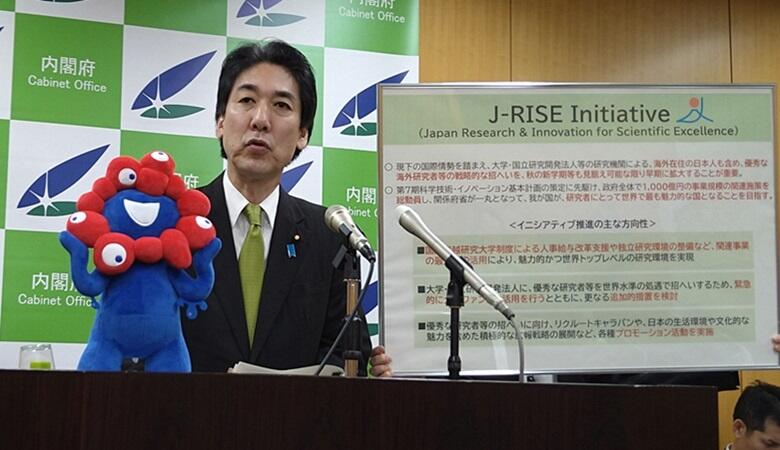To attract excellent researchers from overseas to Japanese universities and research institutions, the government has announced the "J-RISE Initiative" (Japan Research & Innovation for Scientific Excellence), a policy package worth 100 billion yen. Using proceeds from the 10-trillion-yen Japan University Fund, the government will create new recruitment support programs for young researchers and support university and research institution recruitment by combining existing measures. Promotional activities targeting researchers overseas will also be strengthened.
Minoru Kiuchi, Minister of State for Science and Technology Policy, stated: "In preparation for the formulation of the 7th Science, Technology and Innovation Basic Plan, I aim to fundamentally improve Japan's research environment and make Japan the most attractive country in the world for researchers by strongly promoting the initiatives outlined in the Initiative in cooperation with relevant ministries and agencies."

Competition to acquire excellent researchers has intensified due to factors such as the Trump administration's suspension of subsidies to Harvard University and restrictions on foreign researchers. The EU has already announced plans to contribute approximately 500 million euros (about 83 billion yen), and Canada, Singapore, and other countries have also announced support measures to recruit researchers.
At the Council for Science, Technology and Innovation held on June 4, Prime Minister Shigeru Ishiba gave instructions stating that, in order to enhance research capabilities by strengthening "international brain circulation" efforts through the recruitment of excellent researchers from overseas, including those from the United States, Kiuchi should lead collaboration with relevant ministers to urgently consider and implement responsive measures, including support for universities for international research excellence. This policy package was compiled in response to these instructions.
The policy package outlines three directions. First, to realize an attractive, world-class research environment by maximizing the use of related projects, including the establishment of independent research environments through the Universities for International Research Excellence initiative.
Second, to make emergency use of the Japan University Fund while considering additional measures as a government, to enable research institutions to recruit excellent researchers with world-class treatment.
Third, to strategically promote various promotional activities, including recruitment caravans and activities focused on Japan's living environment and cultural attractions, to recruit excellent researchers from overseas.
Specifically, through universities for international research excellence, the WPI (World Premier International Research Center Initiative), and other efforts, the government will advance personnel and salary management reforms to achieve US-level salaries that are 3-5 times higher than Japanese universities, and operational reforms such as implementing English-language administration.
Additionally, the government will promote various programs such as ASPIRE (Adopting Sustainable Partnerships for Innovative Research Ecosystem) to advance large-scale international collaborative research in advanced science and technology fields and strengthen exchanges and networks among excellent researchers, thereby promoting international brain circulation.
Domestic recruitment of excellent researchers active overseas, including Japanese researchers abroad, will be strengthened. Tohoku University, a university for international research excellence, has announced it will spend 30 billion yen over five years to hire approximately 500 people. The second-phase universities for international research excellence, to be decided this year, will also engage in international brain circulation. The government will also send young researchers overseas and accept foreign young researchers through fellowship programs as part of preliminary efforts for the Global Startup Campus initiative and utilize systems such as the Japan Society for the Promotion of Science's Invitational Fellowships for Research in Japan system. Additionally, various measures will be utilized to establish environments that support families accompanying researchers.
When these measures are put together, they amount to approximately 100 billion yen over several years (funding + this fiscal year's budget). As an additional emergency measure, a program will be launched to support the recruitment of young researchers using part of the Japan University Fund's investment returns. While the fund's returns can only be used for universities for international research excellence and SPRING (Support for Pioneering Research Initiated by the Next Generation), the rules will be changed to allow several billion yen to be spent as a special exception.
In the new program, JST (Japan Science and Technology Agency) will conduct public calls for applications targeting each institution, supporting personnel and salary management reforms and business reforms, as well as providing necessary personnel costs and startup expenses. A Cabinet Office official stated: "We expect universities and research institutions to progress their initiatives in advance to meet the autumn enrollment deadline, with public calls for application to follow after the rule revision in August." From next fiscal year onward, regular budgets will be secured for continuous support.
While attracting talented individuals active at overseas universities to Japan is a highly effective method for strengthening research capabilities, the barriers are high when it comes to actually relocating to Japan to conduct research. For example, in the case of a researcher with an annual salary of approximately 30 million yen, approximately 100 million yen annually would be needed on the assumption of 30-million-yen total for three postdocs and 30 million yen for startup expenses, plus various social insurance-related costs, and employment for spouses and educational environments for children would also need to be arranged. For regional universities and others, the barriers are high, making securing cross-appointment efforts more realistic. The new program requires mechanisms that allow even regional and small-scale universities to continuously engage.
This article has been translated by JST with permission from The Science News Ltd. (https://sci-news.co.jp/). Unauthorized reproduction of the article and photographs is prohibited.




